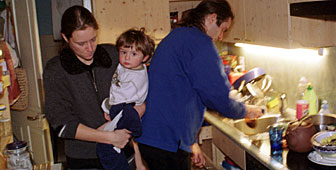Tax breaks to combat poverty

A new report says tax benefits rather than the introduction of a minimum wage could help reduce the number of working poor in Switzerland.
The study by researchers at Bern University recommends granting a tax break to people who work full time but do not earn enough money to stay above the poverty line.
Based on figures from 1998, 4.5 per cent of households are classified as “working poor” – accounting for some 284,000 people. The report’s findings were presented by the economics minister, Pascal Couchepin, on Tuesday.
The authors of the report say the best way to tackle poverty would be to grant needy households tax reductions worth an average of SFr9,000 ($6,016) per year.
The Bern University team also tested a second tax reduction system similar to one used in both the United States and Britain but found it would cost more than twice as much.
Minimum wage
The report points out that offering tax breaks to the working poor is more efficient and less expensive than the introduction of a monthly minimum wage of SFr3,000 – a long-standing demand by the Trades Union Federation.
Unions welcomed the report but disagreed with the findings. They said the best way to combat poverty was a combination of a minimum wage and an increase in child allowances.
However, Couchepin said the study reaffirmed concerns that a high minimum salary could lead to job losses and was more prone to abuse.
“You can only fix a minimum salary according to the work you do,” Couchepin told swissinfo. But he stressed that such a wage could not cover a family budget.
According to the report, families with more than one child, as well as the self-employed, are more likely to benefit from tax reductions than a minimum wage.
The report also says that tax cuts would reduce the number of people dependent on welfare.
Couchepin argued that Switzerland’s low rate of joblessness – currently 2.5 per cent – and high employment is because there is no official minimum salary.
More social security
Couchepin’s comments were echoed by the Swiss Labour Association, which agrees that it is more effective and beneficial to cut taxes. “It is definitely a good idea to reduce taxes, especially for families,” the charity’s Brigitte Steimen told swissinfo.
In addition, the Swiss Labour Association is calling for higher wages and more social security for people in low-paid jobs, particularly for women with part-time employment.
Steimen dismisses suggestions that a minimum wage would lead to job losses. But she has reservations over whether a general minimum salary covering all professions would have a positive impact.
“I think the unions should try to negotiate minimum wages for individual branches, for instance in the hotel and retail trade”, she said.
Poverty on increase
According to the Swiss Labour Association, the number of working people who live below the breadline increased over the past 12 months to more than 500,000 people – substantially more than official statistics.
Those worst affected by the threat of poverty are large families, single parents, workers with only primary education and the self-employed.
A study carried out in Zurich last year also revealed that a third of the total population in Switzerland risks joining the ranks of the working poor.
Charities say poverty is not visible in Switzerland and has been a taboo subject for decades.
by Urs Geiser and Jonathan Summerton

In compliance with the JTI standards
More: SWI swissinfo.ch certified by the Journalism Trust Initiative

You can find an overview of ongoing debates with our journalists here. Please join us!
If you want to start a conversation about a topic raised in this article or want to report factual errors, email us at english@swissinfo.ch.